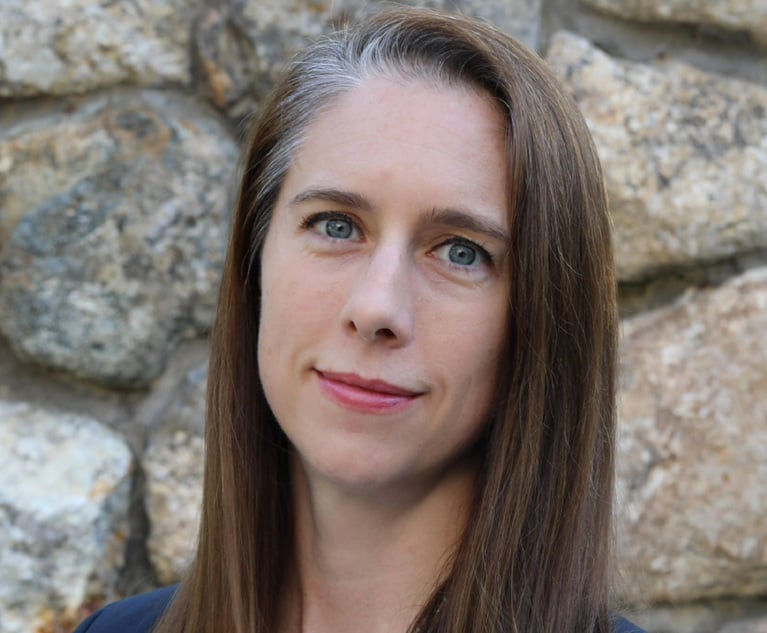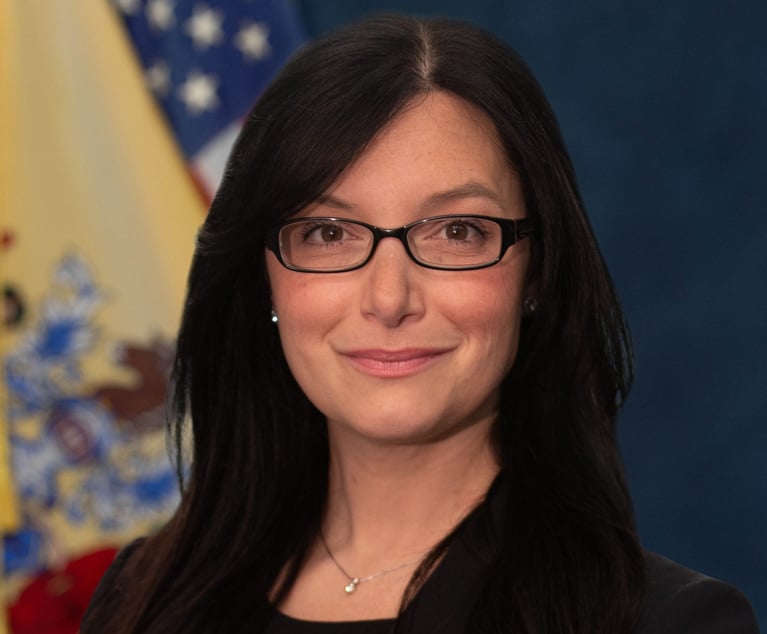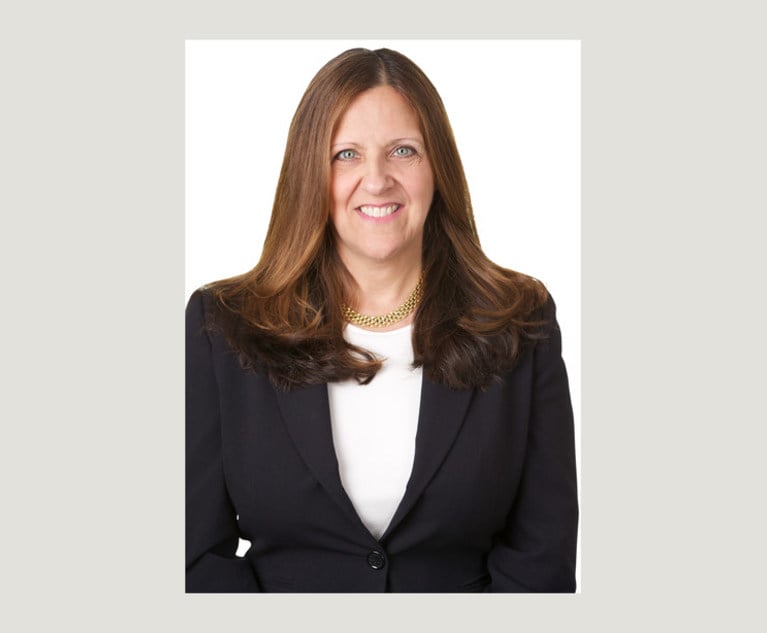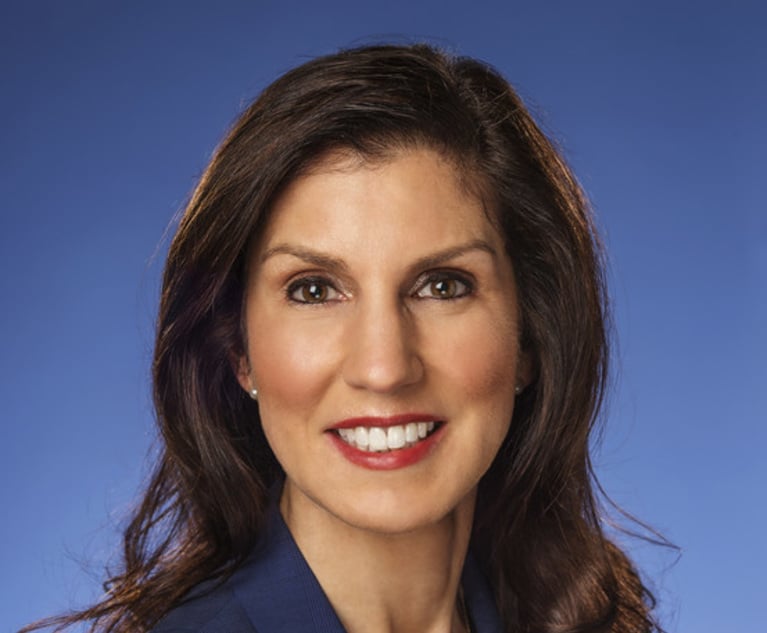 Julia Walker, assistant general counsel of Atlantic Health System
Julia Walker, assistant general counsel of Atlantic Health SystemResearch, Organization, Mentoring Unheralded But Vital, Atlantic Health System's Walker Says
"The behind-the-scenes work that makes the 'big moment' possible is usually the most underappreciated. ... Training, good research and strong workflows are like household utilities—you only notice them when they aren't working."
June 10, 2019 at 05:50 PM
4 minute read
Julia Walker is assistant general counsel at Atlantic Health System, which includes some 400 facilities and nearly 17,000 employees. She has been with Atlantic's legal department for eight years and oversees a team of four attorneys, two paralegals and staff. Last year she oversaw research and implementation of an automated contracts-management tool for providers; and renegotiated physician contracts in an effort that “would typically be sent to outside counsel” were it not for her expertise, one colleague said. “It would be impossible for the department to handle the volume of matters—many of them complex and regulation-driven—and ensure high-quality work and excellent service without the efforts of Assistant General Counsel Julia Walker,” the colleague said.
Law practice is often a team endeavor. What has been your experience with teamwork in the law?
Being part of a team means working with folks who “have your back” which makes the work more fun. Teamwork typically results in more creative approaches to problem solving and a better result for our client. The in-house work is an even bigger team—the enterprise. Health care is a microcosm of so many diverse professions and concerns, which means the enterprise team brings a greater diversity of perspectives and more opportunity to be creative. The collaborative effort of the team ends up making the workplace a better place overall.
What types of work done at law firms and other organizations are commonly underappreciated?
The behind-the-scenes work that makes the “big moment” possible is usually the most underappreciated. Solid research and the ability to find it when a question or solution is being considered are important value-added services, but they are not talked about. Well-organized files and strong workflows that show that all of the necessary approvals have been received and that checklists have been completed are key to getting a good result. There is also the time spent mentoring and training new lawyers. Training, good research and strong workflows are like household utilities—you only notice them when they aren't working.
What can professional groups, legal publications and others do to better shed light on lawyers and law practices doing important work that's under the radar?
There is no shortage of ways to communicate—email, digital magazines, blog posts, etc. What could really elevate and highlight the important work being done is more collaboration between lawyers and law firms. For example, “Giving Tuesday,” setting aside a specific day to give back, could be redesigned for members of the New Jersey bar to participate in signature projects for lawyers or firms across the state. The important work would be highlighted, and New Jersey lawyers could come together for a common purpose, which builds community.
What must firms do to ensure that lawyers remain engaged with pro bono work, their communities and their families?
Law firms and employers have to provide the time and support to allow lawyers to be focused on more than one priority. At Atlantic Health System, we ask our lawyers and team members to stay focused on the work when at work and be equally focused on their families and communities when at home. It is important to be “all in” at work and at home. Employers have to empower their team members to not be at work 24/7. Good team members want the best for the team and will work hard when it is time to work. That same commitment to family and community is enhanced when a team member feels that their employer values a work/life balance.
How are the business and profession of law changing, and are New Jersey lawyers well-positioned for the future?
New Jersey is a fast-paced, high-energy place to live; which makes it the perfect setting for the profession of law. We're a relatively tiny state, but everyone wants to be here, so lawyers can practice in nearly any area of law or business you can think of.
Furthermore, with the nearly-instantaneous access of information digitally available through a simple Google search, interest in the law by individuals outside the legal community has never been higher, and that makes the practice of law much more interesting—and our clients much more engaged in their representation.
This content has been archived. It is available through our partners, LexisNexis® and Bloomberg Law.
To view this content, please continue to their sites.
Not a Lexis Subscriber?
Subscribe Now
Not a Bloomberg Law Subscriber?
Subscribe Now
NOT FOR REPRINT
© 2024 ALM Global, LLC, All Rights Reserved. Request academic re-use from www.copyright.com. All other uses, submit a request to [email protected]. For more information visit Asset & Logo Licensing.
You Might Like
View All
For Lawyers, the 'Work' of Making an Impact Does Not Have to Happen in a Courtroom. Laura E. Sedlak Says

Doing the Right Thing in the Pursuit of Justice Requires Guts, Says Lyndsay Ruotolo

One Can be Most Impactful When Their Pursuits Are Driven by Their Concerns and Passions, Says Sherilyn Pastor

As a Lawyer, You Have a Powerful Way to Make an Impact, Says Mary Frances Palisano
Trending Stories
Who Got The Work
Michael G. Bongiorno, Andrew Scott Dulberg and Elizabeth E. Driscoll from Wilmer Cutler Pickering Hale and Dorr have stepped in to represent Symbotic Inc., an A.I.-enabled technology platform that focuses on increasing supply chain efficiency, and other defendants in a pending shareholder derivative lawsuit. The case, filed Oct. 2 in Massachusetts District Court by the Brown Law Firm on behalf of Stephen Austen, accuses certain officers and directors of misleading investors in regard to Symbotic's potential for margin growth by failing to disclose that the company was not equipped to timely deploy its systems or manage expenses through project delays. The case, assigned to U.S. District Judge Nathaniel M. Gorton, is 1:24-cv-12522, Austen v. Cohen et al.
Who Got The Work
Edmund Polubinski and Marie Killmond of Davis Polk & Wardwell have entered appearances for data platform software development company MongoDB and other defendants in a pending shareholder derivative lawsuit. The action, filed Oct. 7 in New York Southern District Court by the Brown Law Firm, accuses the company's directors and/or officers of falsely expressing confidence in the company’s restructuring of its sales incentive plan and downplaying the severity of decreases in its upfront commitments. The case is 1:24-cv-07594, Roy v. Ittycheria et al.
Who Got The Work
Amy O. Bruchs and Kurt F. Ellison of Michael Best & Friedrich have entered appearances for Epic Systems Corp. in a pending employment discrimination lawsuit. The suit was filed Sept. 7 in Wisconsin Western District Court by Levine Eisberner LLC and Siri & Glimstad on behalf of a project manager who claims that he was wrongfully terminated after applying for a religious exemption to the defendant's COVID-19 vaccine mandate. The case, assigned to U.S. Magistrate Judge Anita Marie Boor, is 3:24-cv-00630, Secker, Nathan v. Epic Systems Corporation.
Who Got The Work
David X. Sullivan, Thomas J. Finn and Gregory A. Hall from McCarter & English have entered appearances for Sunrun Installation Services in a pending civil rights lawsuit. The complaint was filed Sept. 4 in Connecticut District Court by attorney Robert M. Berke on behalf of former employee George Edward Steins, who was arrested and charged with employing an unregistered home improvement salesperson. The complaint alleges that had Sunrun informed the Connecticut Department of Consumer Protection that the plaintiff's employment had ended in 2017 and that he no longer held Sunrun's home improvement contractor license, he would not have been hit with charges, which were dismissed in May 2024. The case, assigned to U.S. District Judge Jeffrey A. Meyer, is 3:24-cv-01423, Steins v. Sunrun, Inc. et al.
Who Got The Work
Greenberg Traurig shareholder Joshua L. Raskin has entered an appearance for boohoo.com UK Ltd. in a pending patent infringement lawsuit. The suit, filed Sept. 3 in Texas Eastern District Court by Rozier Hardt McDonough on behalf of Alto Dynamics, asserts five patents related to an online shopping platform. The case, assigned to U.S. District Judge Rodney Gilstrap, is 2:24-cv-00719, Alto Dynamics, LLC v. boohoo.com UK Limited.
Featured Firms
Law Offices of Gary Martin Hays & Associates, P.C.
(470) 294-1674
Law Offices of Mark E. Salomone
(857) 444-6468
Smith & Hassler
(713) 739-1250






